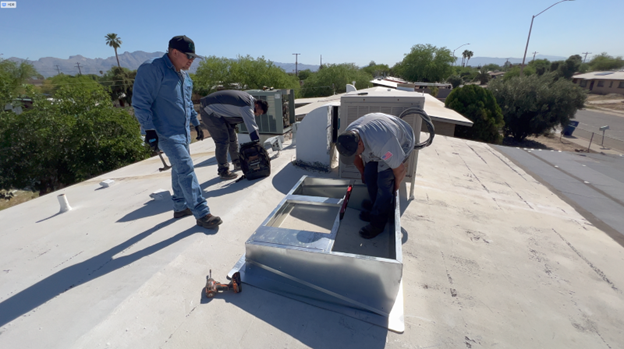For many, the winter months bring a period of relief from the pollen and allergies of the warmer seasons. However, indoor air quality during the colder months can still be problematic, especially if your HVAC system isn’t helping as much as it could. Poor indoor air quality can exacerbate allergy symptoms, even in the winter. In this post, we’ll explore how your HVAC system can play a crucial role in improving indoor air quality and help you breathe easier during the colder months.
How Poor Indoor Air Quality Affects Your Health
Even though allergens like pollen may be less prevalent during the winter, other allergens can circulate in your home if your HVAC system isn’t properly maintained. The lack of ventilation combined with the dry air from heating systems can make these allergens even more irritating to the respiratory system.
Common indoor allergens include:
Dust mites: These microscopic creatures thrive in warm, humid environments. They can live in your bedding, carpets, upholstery, and even your HVAC ducts.
Pet dander: Even if your pet isn’t shedding as much in the winter, dander from skin cells and saliva can accumulate in your home and be carried through the air by your HVAC system.
Mold spores: Mold thrives in areas with high humidity, and even though the air is dry in winter, mold can still develop in hidden spots like bathrooms, kitchens, and ducts if there’s inadequate ventilation.
Bacteria and viruses: While less common, bacteria and viruses can be spread through the air, particularly if your HVAC system isn’t equipped to filter them out effectively.
These allergens can cause a range of symptoms, including sneezing, coughing, congestion, itchy or watery eyes, asthma flare-ups, and dry or irritated skin
If you’re noticing an increase in allergy symptoms inside your home, it may be time to consult a technician at Oasis to evaluate your HVAC system’s ability to filter out harmful particles.
How Your HVAC System Can Help Improve Air Quality
Upgrading Your Air Filters
The filter in your HVAC system is the first line of defense against dust, pet dander, and other allergens. Regularly replacing or upgrading your filter can significantly improve air quality. Opt for a high-efficiency particulate air (HEPA) filter or a MERV-rated filter to trap even the smallest particles in the air.
Installing an Air Purifier
For an added layer of protection, consider installing an air purifier or an air cleaning system in your HVAC setup. These systems can remove smaller particles that the standard filter may miss, including bacteria and viruses. UV lights are also a popular addition to HVAC systems, as they can kill germs and reduce the growth of mold and mildew.
Regular Duct Cleaning
Over time, dust, dirt, and allergens can build up inside your ducts. When your HVAC system turns on, these particles are pushed out into your home. Regular duct cleaning can reduce the amount of debris in your system and help prevent it from being spread through the air.
Humidification
Dry air can exacerbate allergy symptoms and cause your nasal passages to become dry and irritated. Installing a whole-home humidifier can help maintain balanced humidity levels in your home, which is beneficial for your respiratory health, as it keeps your mucous membranes moist and less susceptible to irritation.
ConclusionWhile it may not be allergy season outside, indoor allergens can still pose a problem for many homeowners, particularly during the winter months when windows are closed and ventilation is limited. By upgrading your HVAC system, changing filters regularly, and considering air purification options, you can drastically improve your indoor air quality and breathe easier. If you’re struggling with allergy symptoms and want to learn more about improving air quality in your home, don’t hesitate to reach out to Oasis – we’re here to help!


0 Comments